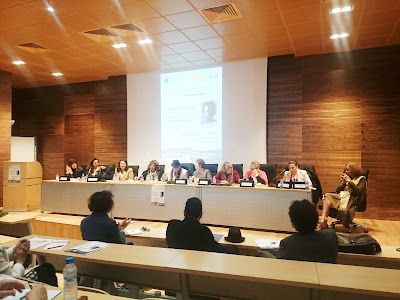In Collaboration with the Gender
Studies Research Group at Ibn Tofail University, the PLCC Faculty organized a
workshop in tribute to Fatema Mernissi in March 31st, 2016 at the UIR campus. The workshop was divided into four parts: the opening session and
welcoming speech (09:30 to 10:00), "Panel 1: Testimonies (10:00 to 10:50)," "Panel
2: A book of her own: Rewriting glocal feminism (11:00 to 12:00)," and "Panel
3: A dream of her own: Women’s daily battles (12:00 to 13:00)."
The opening
session and welcoming speech (09:30 to 10:00) was initiated by Mr. Najib
Mokhtari from UIR, who welcomed the participants and guests from UIR and ITU and read a short poem he composed in memory of Fatema Mernissi. After that, he
gave the floor to Mr. Abdelaziz Benjouad, the vice president of research and
development at UIR, who gave an opening talk on behalf of the president of UIR. Next, Ms. Hakima Fassi Fihri, Head of International Relations and
Partnerships at IUR, took the floor, welcoming the participants and guests, and
clarified the context of the workshop, that is the International Women’s Day of
the 8th of March. She then gave the floor to Ms. Soumaya Belhabib, the Coordinator
of the Gender Studies Research Group at ITU, who closed the opening session
with a talk on the academic contribution of Fatema Mernissi and its inspirational impact on
current and would-be scholars. In addition, she stated that the workshop dedicated to Fatema Mernissi
is part of the mission of the Gender Studies Research Group at ITU, which is to
promote “ethical principles of justice, equity, human rights and democracy
through education and research in the realm of gender.” Prof. Soumaya Belhabib concluded
this speech by expressing her thanks to the people who made this event possible,
and welcomed the participants and guests. After that, Mr. Najib Mokhtari played
a video clip that highlights the achievements of some great Moroccan and
non-Moroccan women like Nawel Al Moutawakel, Aicha Ben-Chenna and Leola N.
King.
“Panel 1:
Testimonies (10:00 to 10:50)” was moderated by Mr. Mohamed El Himer, Head of
the Multidisciplinary Studies Research Laboratory at ITU. In this first panel,
the floor was given to speakers from different backgrounds who had a
relationship, whether academic, personal or both, with the late Fatema
Mernissi. The first speaker was Ms. Asmae Benadada, Sociologist at Sidi Mohamed
Ben Abdallah Dhar El Mehraz, Fez. In a talk in Standard Arabic, she paid
tribute to Fatema Mernissi, listing her admirable personal and academic traits
and intellectual achievement. She also expressed how inspiring Fatema Mernissi
was for her academic, intellectual and feminist journey, and how influential she
is in the field of sociology and gender studies. Next, the floor was given to
Ms. Dima Droubi, a writer, who told her own story with the works of Fatema
Mernissi, and how these works inspired her to write her novel “La Sultane du
Caire.” The floor was then given to Ms. Rachida Guelzim, a textbook writer and teacher trainer at the British Council, Rabat, who told some of her personal
stories with the late Fatema Mernissi, which were full of funny
and inspirational anecdotes. Ms. Maria Moukrim, web editor of Febrayer.com,
also told her intellectual story with Fatema Mernissi, saying that Fatema Mernissi used to
encourage female journalists to pursue their intellectual and feminist
aspirations. After the talk of Ms. Maria Moukrim, Ms. Dominique Benbrahim, public affairs officer in the US embassy of Rabat, and Ms. Damia Benkhouya, member of the Regional Council for Human Rights in Rabat-Kenitra, among others, paid tribute to
Fatema Mernissi through their talks that recount
their relationships with Fatema Mernissi, personal, academic, or both.
The second and third panels as
planned in the flyer were combined in one panel, which was moderated by Mr.
Mustapha Bencheikh, Professor & Director of the PLCC at UIR, and Mr. Najib
Mokhtari, Associate Professor in the same university. The opening speech was
delivered by Mr. Mustapha Bencheikh, in which he expressed his admiration for
Fatema Mernissi and appreciation of the talks given in the first sessions. Mr.
Najib Mokhtari then gave the floor to Ms. Raja Rhouni, Professor at Chouaib
Doukkali University, El Jadida, who gave a talk entitled “Decolonizing
Feminism” based on her doctoral research on the works of Fatema Mernissi. In
this talk, Ms. Raja Rhouni discussed the secular and Islamic works of Mernissi
through Marnia Lazreg’s concept of decolonizing feminism. The second talk was
given by Aili Mari Tripp, a Professor at the University of Wisconsin, Madison, and
was entitled “Fatema Mernissi’s Feminism Goes West,” through which she
highlighted the international influence of Fatema Mernissi, who was considered
outside Morocco the spokesperson of third world women. After that, the floor
was given to Mr. Mourad Mkinsi, Professor at Ibn Tofail University, Kenitra,
who paid tribute to Mernissi through a talk entitled “Fatema Mernissi and the
Challenge of Equality.” Prof. Mkinsi stated that Mernissi had a strategic
approach in her campaign for equality, always considering how her works would
be received by readers and how they would influence gender politics in Morocco.
He added that she combined academic inquiry with activism, making her a true
organic intellectual. The last talk was delivered by Mr. Amine Benhallam,
director of Fatema Mernissi Youth Think Tank at ILCS, Rabat, under the title of
“Fatema Mernissi et les sciences sociales phronétiques.” In his talk, Mr. Amine
Benhallam highlighted, among other points, Fatema Mernissi’s tenacity through the character of
Aisha, the central figure of her book The Veil and the Male Elite.
In conclusion, the workshop
remained faithful to its aim; it did indeed pay tribute to a figure as
influential as Fatema Mernissi. Except for the absence of the discussion part,
the workshop was well-organized with participants, writers and academics, from
different backgrounds but with a shared admiration for Fatema Mernissi as a person
and intellectual.












0 comments:
Post a Comment